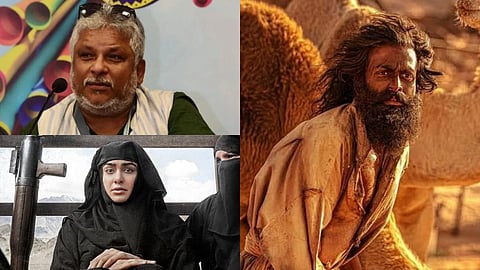

The debate around the 71st National Film Awards refuses to die down. Months after Sudipto Sen’s controversial film The Kerala Story won Best Direction and Best Cinematography over Blessy and Prithviraj Sukumaran’s widely admired Aadujeevitham, an Instagram exchange between the filmmaker and an influencer has added more fuel to an already disputed verdict.
Responding to a user who questioned the cinematography award, Sudipto Sen asked, “Do you know why an award is given for cinematography?” He added that he “also liked Aadujeevitham” but claimed its visuals were “created with VFX”, and urged the commenter to “listen to the juries” rather than argue online. He then shifted to a corrective tone, telling the user that although Instagram gives people a chance to write, it “does not give you the right to write anything”. He quoted the proverb “a little learning is a dangerous thing” and ended by saying that since the commenter is “from Kerala,” he expects “more sensible things from Keralalites”.
The reply did not land well. Influencer Carl Lafrenais replied with what many users called the most sensible response in the thread. He pointed out that VFX drove some of the most celebrated visual achievements in world cinema. “That is why Blade Runner 2049 won the Oscar for Best Cinematography. It is why Life of Pi, Gravity and Dune also took home the same award.” If VFX were a disqualifying factor, he argued, then “half of the greatest visual achievements in cinema would not even be in the conversation.”
He then turned to Sudipto’s moral lecture about Instagram giving people a platform to write anything. Lafrenais countered that this is, in fact, the point of a public forum. “It is called freedom of expression. A little understanding of democracy might help too. 😉” He closed with a sharp sign-off that echoed the sentiment of many viewers: “For the love of cinema, do not compare your "movie" [The Kerala Story] with Aadujeevitham. 🤦🏽♂️”
The comment section has since tilted firmly in favour of the influencer. For months, social media users and cinephiles have repeatedly flagged what they call the “subpar” cinematography of The Kerala Story, especially after it was handed a National Award over films like Aadujeevitham. The Kerala Story has long been criticised for simplistic craft and for being a propaganda vehicle. Its National Award recognition reopened arguments of merit, jury bias and credibility.
The Aadujeevitham omission in particular had triggered disbelief. Blessy’s desert survival epic had been hailed for its scale, visual ambition and Prithviraj Sukumaran's brilliant performance. Even jury head Ashutosh Gowariker had once compared the film to Lawrence of Arabia, according to Blessy, who later questioned how the same jury could later hide behind “technical shortcomings” to deny it.
Upon its release, critics in general have called The Kerala Story insensitive and cinematically weak. The much-circulated claim in the film that 32,000 women from Kerala had joined ISIS was later contradicted by filings from the Ministry of Home Affairs, exposing the scale of exaggeration at the heart of the narrative. Despite poor critical reception, the film was a box office success, feeding on controversy and public polarisation.